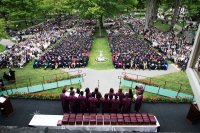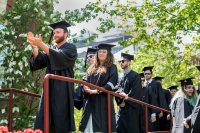
When we confront the skeptics of science, we tend to return fire with a fire-hose of facts and figures.
“We often treat skeptics like a high-school debater would: We rattle off a litany of reasons why they are wrong,” said Dr. Nirav Shah, director of the Maine Center for Disease Control and featured speaker of the 156th Commencement of Bates College on May 29. “We try to pop as many balloons as possible with our pin.”
It’s a bad approach on two accounts, Shah told the graduating seniors. “In the history of recorded thought, not a single mind has ever been changed via that approach.”
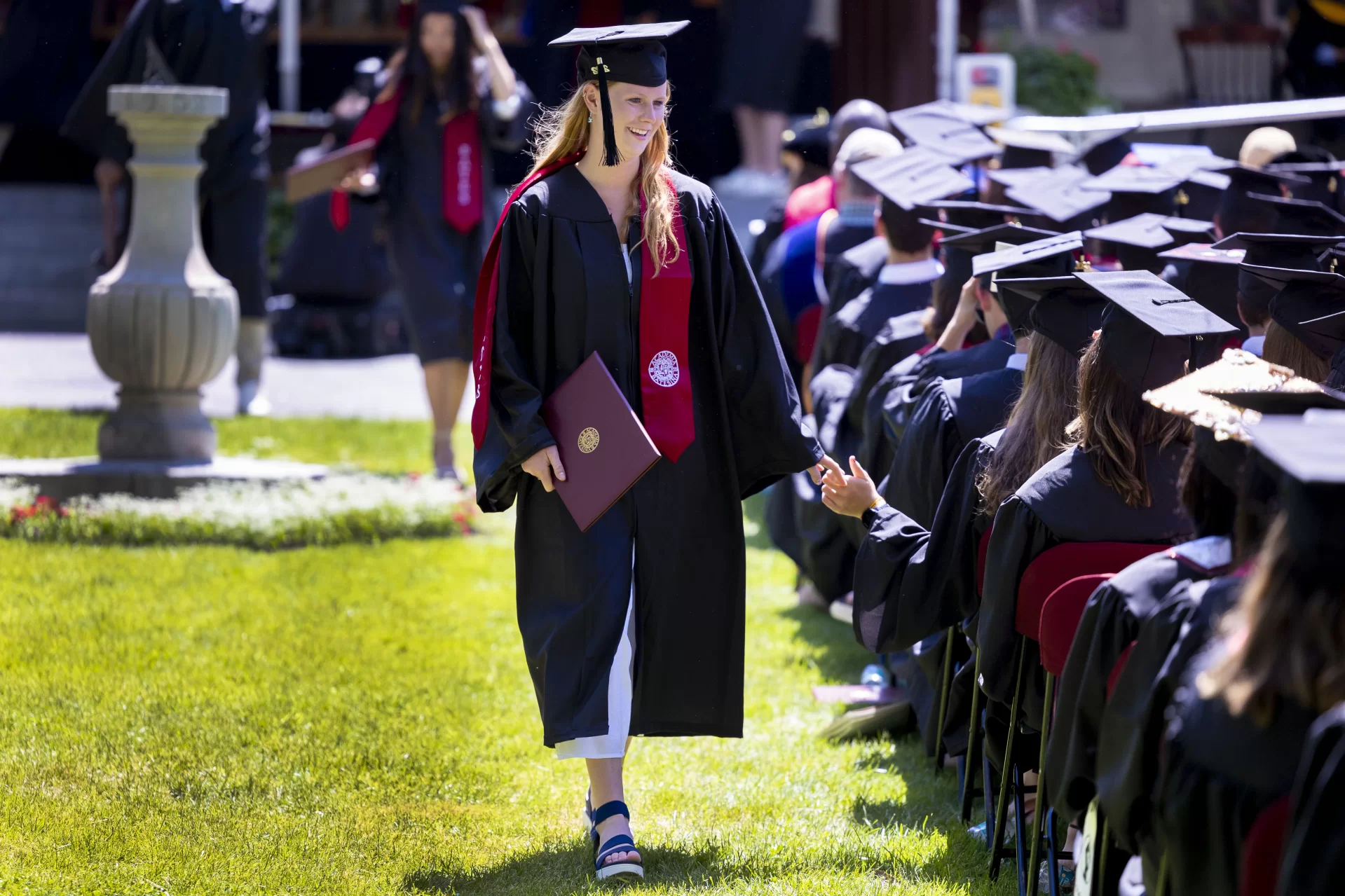
And worse, our refutation is often accompanied by condescension. “We treat those with different beliefs not just as incorrect, but as ignorant. Please don’t do that,” he advised.
Instead, try a little humanity. “Be someone who builds trust,” said Shah, a luminary of Maine’s response to the COVID-19 pandemic.
On a sunny and warm morning, Shah’s personal, insightful, and occasionally very funny address was heard by 498 seniors and their loved ones, faculty, and staff under the trees of the Historic Quad and watched around the world via livestream. After two disrupted Commencements — a virtual edition in 2020 and a split, morning-afternoon in-person edition last year — this year’s ceremony felt like a block party.
The complete 2022 Bates Commencement video.
In the spirit that it’s always a good time to give offer thanks, appreciation, and maybe just a “way to go,” President Clayton Spencer changed up her traditional welcome, pausing early on to ask the audience gathered before Coram Library to raise a cheer to this year’s seniors for all they’ve been through.
That cheer — which timed out at a generous 14 seconds — helped mark the joyful return of Bates Commencement pomp and circumstance, accompanied by sweet and well-chosen words from Spencer, Shah, and others, including senior speaker Teresa Chico ‘22 and Alumni Association president Jennifer Crawford ‘01.
Shah was one of four honorary degree recipients, the others being:
- Michael Bonney ’80, a nationally recognized biotech CEO whose extensive philanthropy has funded the Bonney Science Center, new professorships, and innovations in STEM education at Bates.
- Nikki Giovanni, a widely acclaimed poet, teacher, and voice of the Black experience for more than 50 years.
- The Rev. Becca Stevens, an author and social entrepreneur whose Thistle Farms organization supports those who have experienced trafficking, prostitution, and addiction.
With the pandemic not yet in the rear-view mirror — it’s more in the side mirror — Spencer sought to illuminate what the seniors gained despite all they lost.
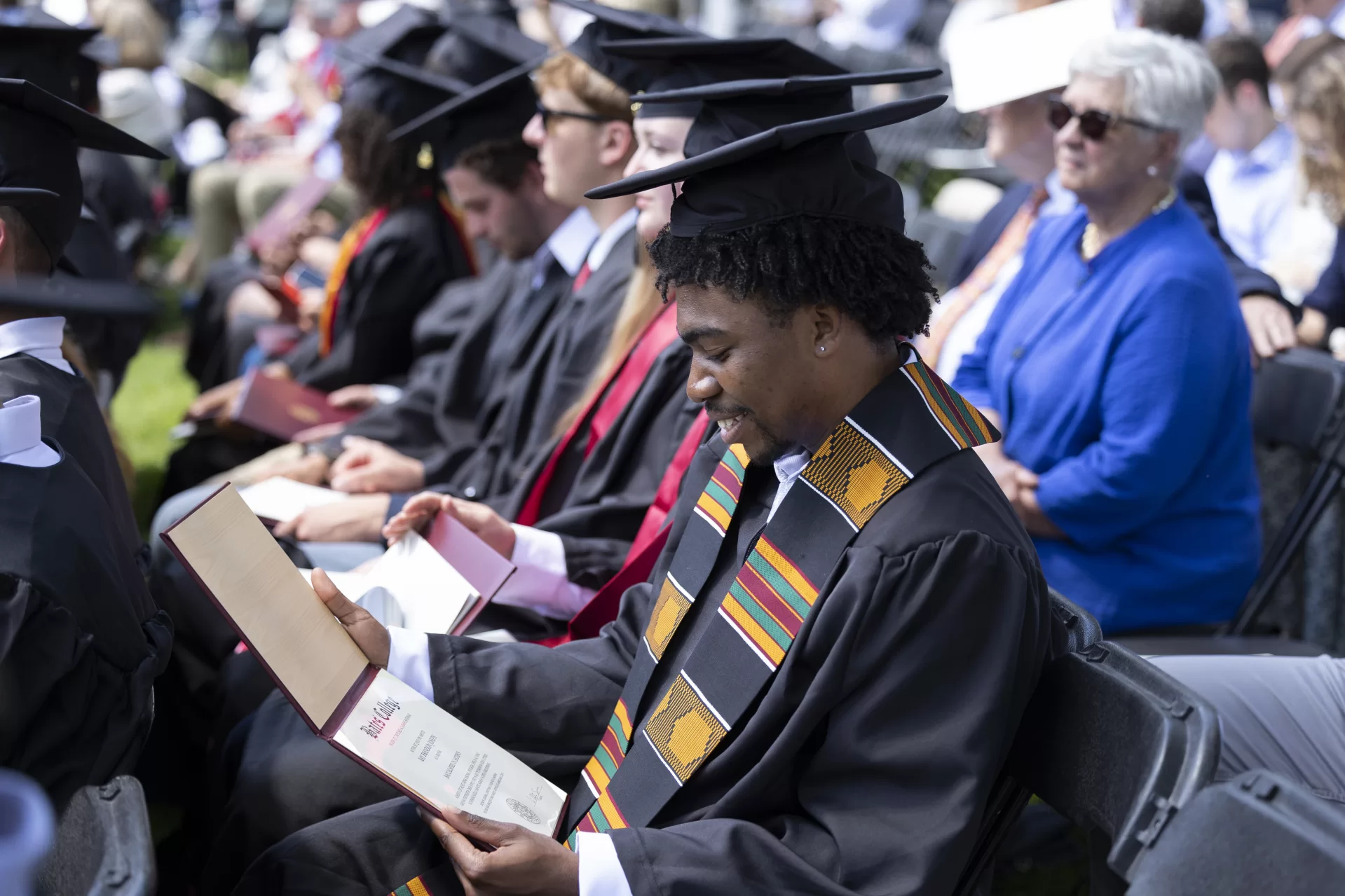
External events, whether COVID-19 or the “pervasiveness of racism and racially-motivated violence in this country,” radically transformed the minute-to-minute campus experience of this year’s seniors, intruding “insistently and persistently, into every dimension of your college experience since the spring of your sophomore year.”
Yes, the Class of 2022 has missed much, Spencer and others noted. For example, while typically nearly 60 percent of a Bates class would study abroad at some point in their college careers, less than 10 percent of the Class of 2022 got that opportunity.
Four straight sports seasons were canceled or severely curtailed. Campus offerings, especially in the arts, were stripped down to the physically distanced minimum. Students ate from take-out containers for the 2020–21 year.
“It would be easy to focus on what you may have missed in your college experience,” Spencer said. “I urge you, however, to think about what you have gained,” the ability to “move through the world more consciously and intentionally than a typical graduating senior.”
Any graduation is a singular accomplishment, she said, and “we are so very proud of all of you. But I also want to lift up and recognize these other gifts — the broadened perspective, the early wisdom, and the deepened empathy — that will be your superpowers as you venture forth to make the world a better place.”
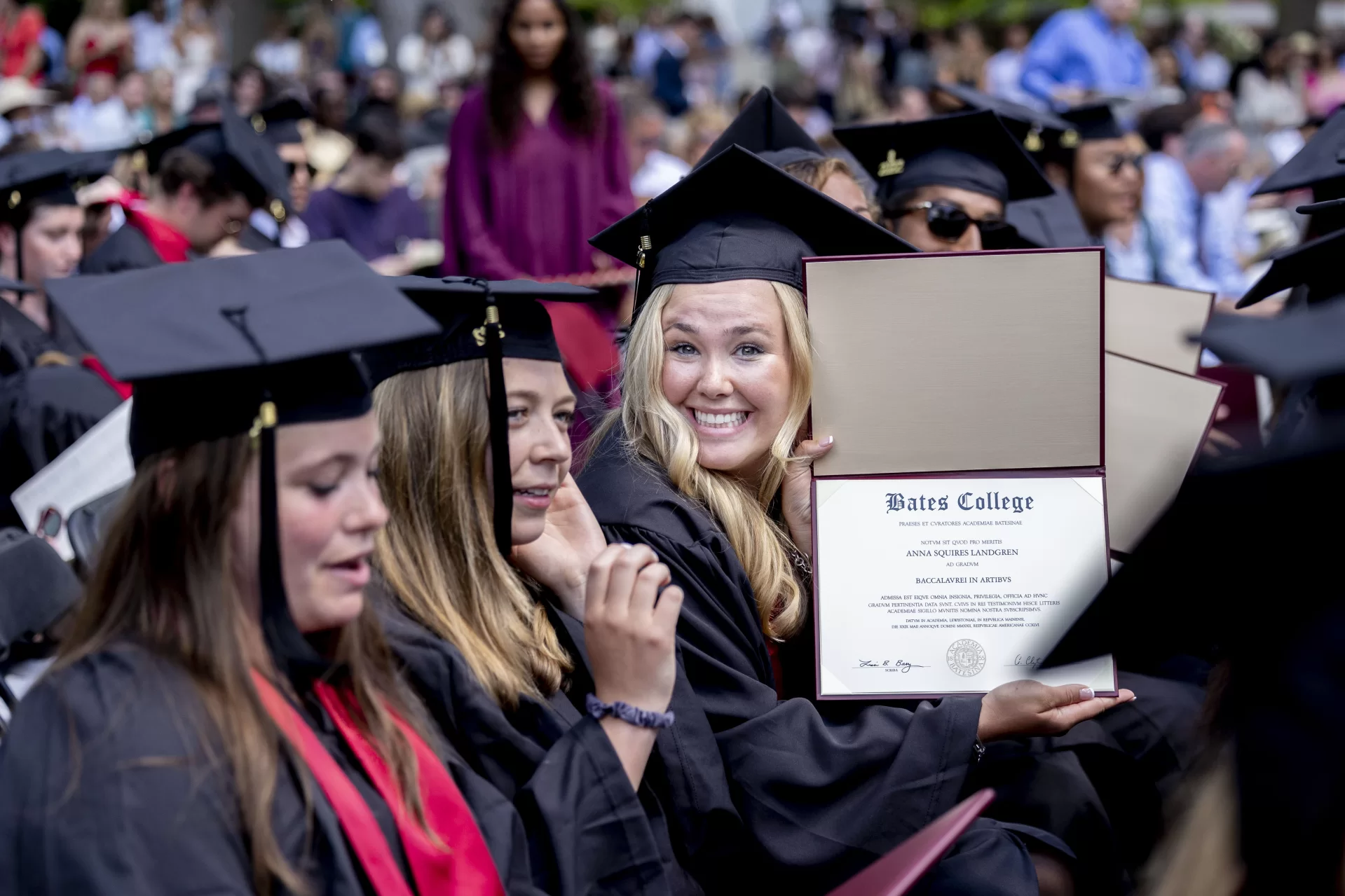
In delivering Shah’s honorary degree citation, Dean of the Faculty and Vice President for Academic Affairs Malcolm Hill said that Shah used his “powerful intellect and profound humanity” to become Maine’s “calm and sure-footed guide through uncharted territory” as COVID-19 barreled into the state in 2020.
Whether leading daily media briefings, joining public radio call-in shows, convening Zoom discussions with community leaders, or through his own deft and often witty forays into social media, Shah became “not just our doctor in chief but our counselor, philosopher, and sage.”
In many ways, this year’s Commencement rhetoric helped to deliver, as they say, the cure for what ails us. And if laughter is the best medicine, that cure was also in ample supply at Commencement, thanks to Shah’s wit and humor, setting the tone with a selfie from the Coram Library porch as he kicked off his address. “If you don’t want to be on Twitter, let me known now,” he quipped to the audience of several thousand.
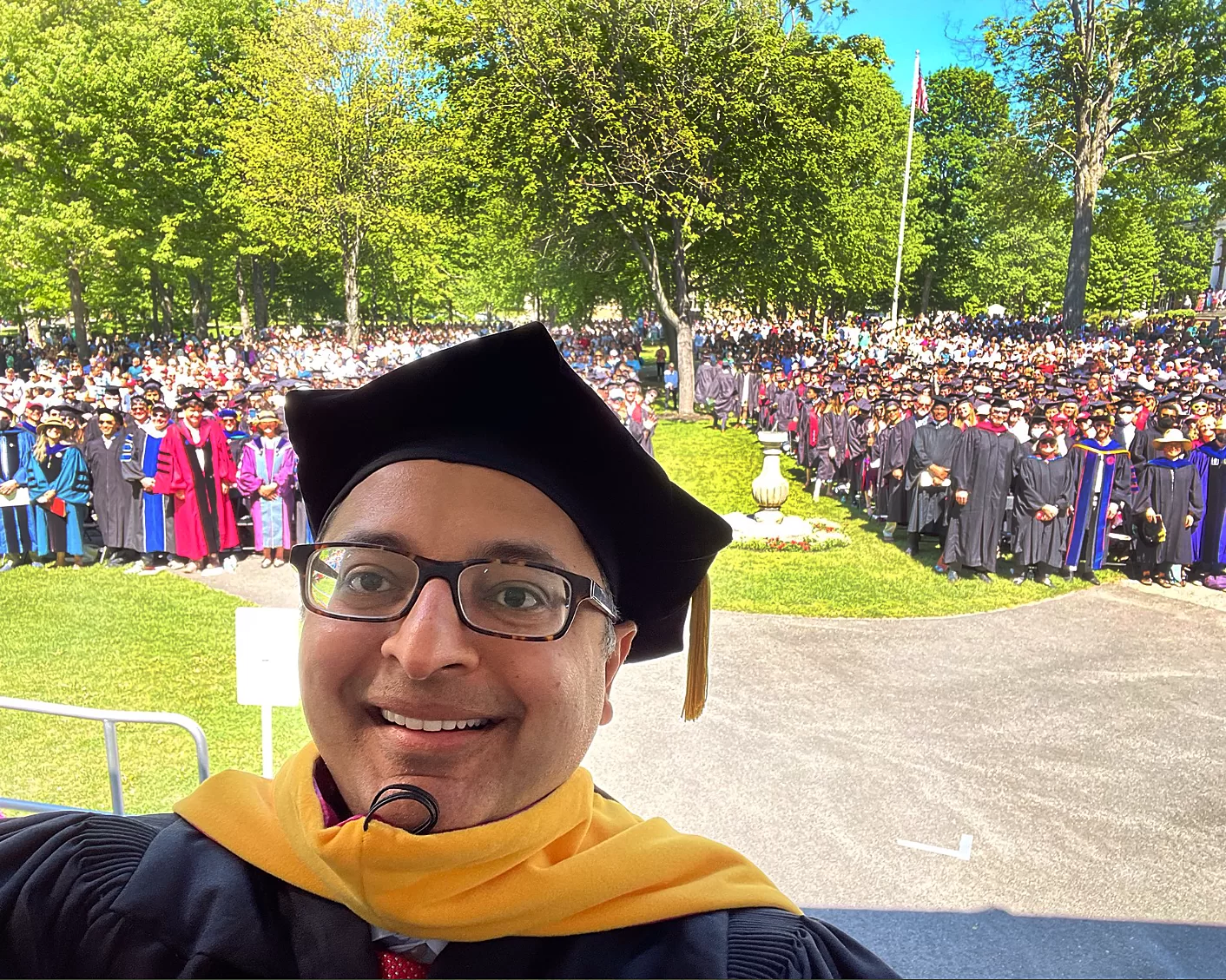
He kicked off his address with these standup-quality one liners:
- “Just remember: If you like what I have to say today, my name is Nirav Shah,” he said. “If you don’t like what I have to say, just remember that my name is Sanjay Gupta.”
- Shah said he devoted the same energy and care to his talk that seniors devoted to their theses. “So last night, after downing a bunch of Red Bulls and literally reaching the end of Twitter, I started writing.”
- When he graduated from college, he said he thought he was powerful and independent, “a one-man wolf pack. But the truth is, I was basically a house cat, completely dependent on others, yet fully convinced of my own independence.”
Shah listed notable Bates Commencement speakers, including from the 1960s and 1970s, and noted that they have since died. “What’s up with that?” he asked. “There is an uncanny correlation between speaking at Bates and then dying 30 to 50 years later. And if there’s anything I’ve learned in the past two years it’s that correlation always equals causation.” (A well-delivered pandemic-era joke that prompted a long round of applause.)
Shah’s address was packed with insight and delightful personal details as he asked the graduates to approach life with humility, humanity, and humor, three qualities that Shah learned from his father, a man who went from picking mangoes in rural India to earning his medical degree in America.
Shah’s theme was “Be Someone,” a phrase that’s crackled in his mind for a few years. His voice breaking, Shah told the audience that he’d lost his father three years ago after a long illness. But before that, knowing his father’s health was declining and his help would be needed, Shah lived with his mother and father in Houston.
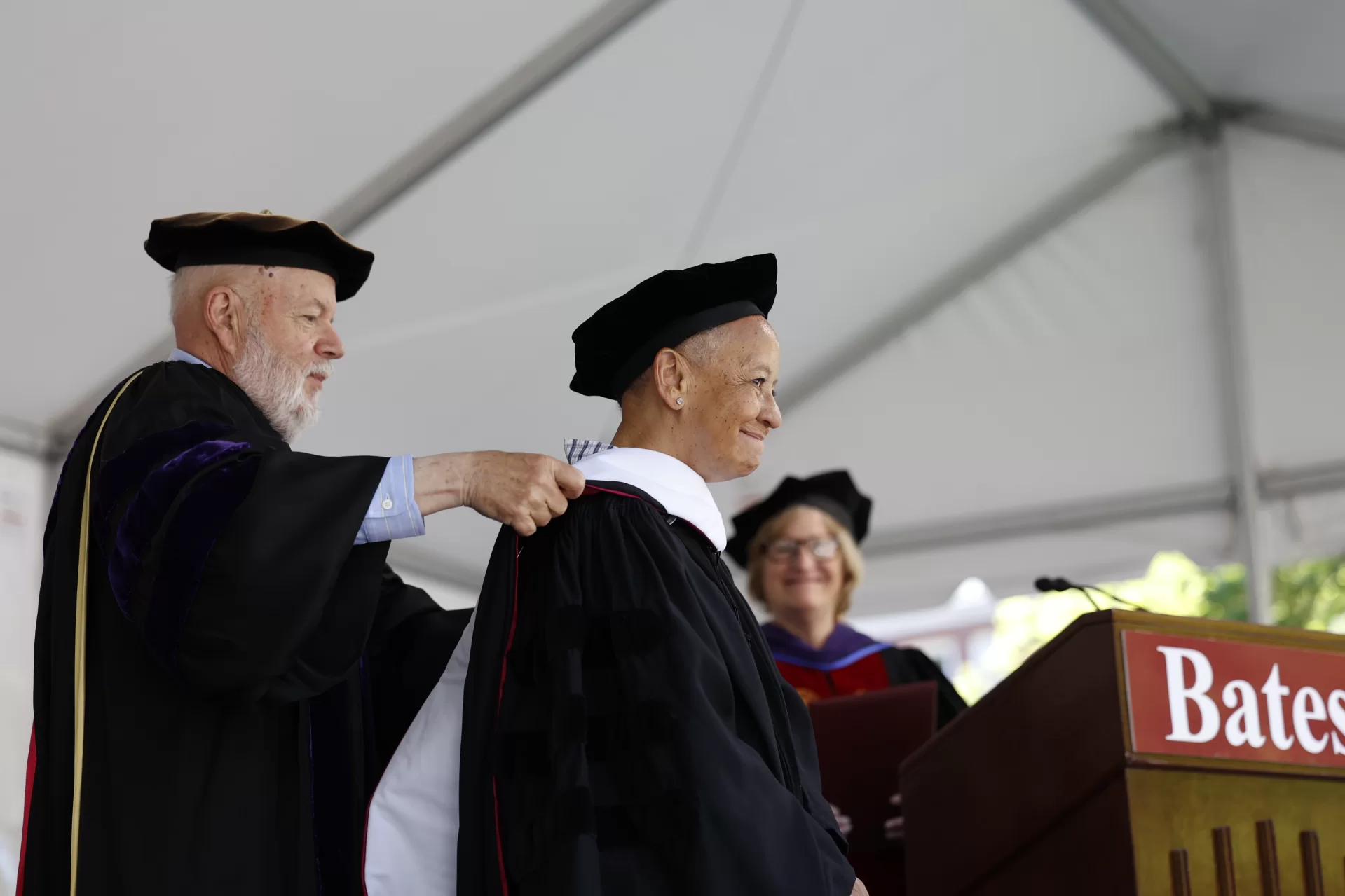
One day he and his father were driving back from a medical appointment and passed beneath a graffiti-strewn railroad bridge. “It wasn’t just everyday graffiti. It was graffiti with meaning,” Shah said. Two words captured his attention, “elegant in their simplicity, compelling in their directness, and poetic in their brevity: Be Someone.”
The two words captured “how my dad himself lived his life. How I try to live my life. And how, today, I’d like to urge you to live your lives.” Shah asked the seniors to Be Someone the way his father did, with humility, humanity, and humor.
Humility, he said, “comes down to saying the three hardest words in the English language: ‘I don’t know.’” Shah said that he used to think that “intelligence came from accumulating the largest warehouse of knowledge,” and Shah does have a big store, holding both a medical and law degree from the University of Chicago.
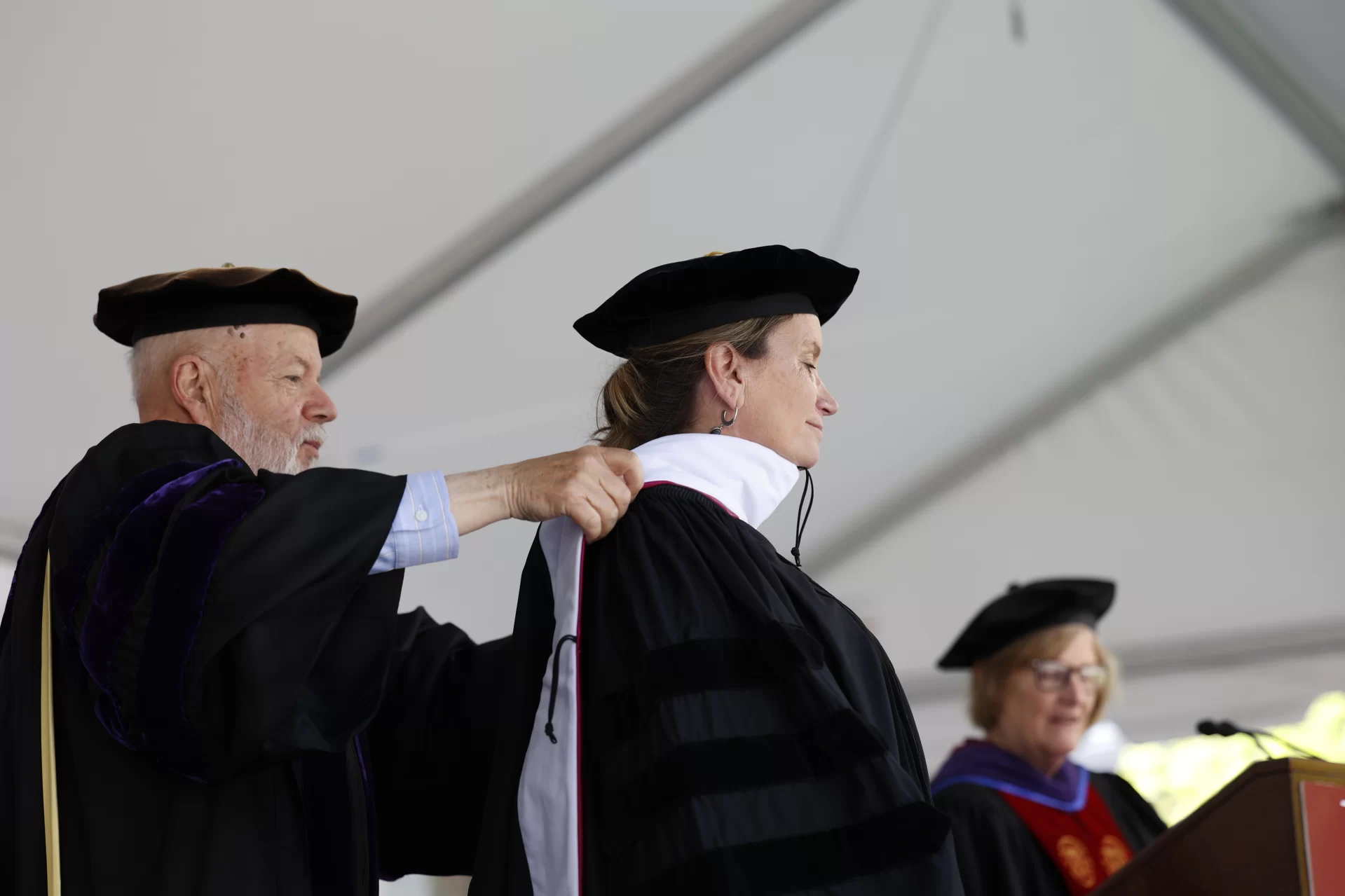
But “frankly, this approach led to me being tremendously unlikeable. My middle name should have been ‘Well, actually,’” he quipped. “For me, being smart was like having the only pin at a balloon party. And achievement was walking around popping everyone else’s balloons.”
If you don’t know something, just say so. “If someone asks you what time it is, do not tell them how to build a clock. If you don’t know what time it is, tell them that.”
Humanity, Shah said, is how his father confronted skeptics. “Rather than dismissing those who asked skeptical questions, he treated them with humanity.” And humanity strengthens the “chain of trust” that allows Shah to have full confidence in his fellow scientists, specifically believing in the effectiveness of the vaccines for COVID-19.
“I’ve been asked numerous times how I know that the COVID vaccines are effective? After all, I didn’t perform the studies myself. So how can I know that the vaccines are doing their job?”
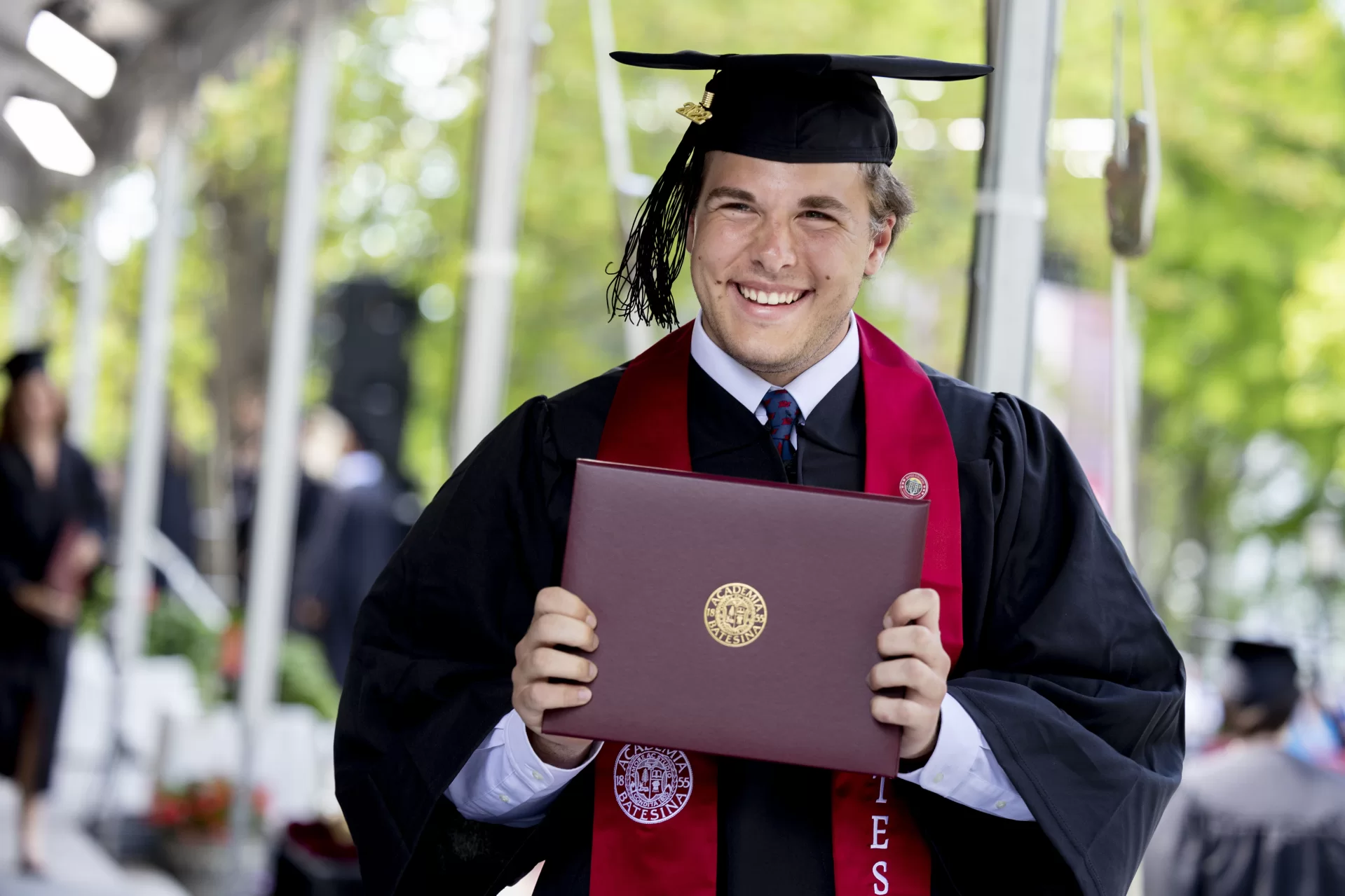
He knows vaccines are effective because he is “part of a ‘chain of trust’ with the people who have concluded so,” including scientists, physicians, and statisticians, to name a few. “I trust the conclusion because I trust each of the links in that chain.”
Skeptics, on the other hand, are often “part of a different chain of trust whose links comprise lived experiences and relationships, not data in scientific journals. They are susceptible to misinformation because they do not belong to the same chain of trust that scientists do.”
But do not dehumanize those who disagree. “Rather, recognize that their skepticism may stem from being part of a different chain of trust. Be someone who builds trust: Ask why they believe what they do. What evidence might change their mind?”
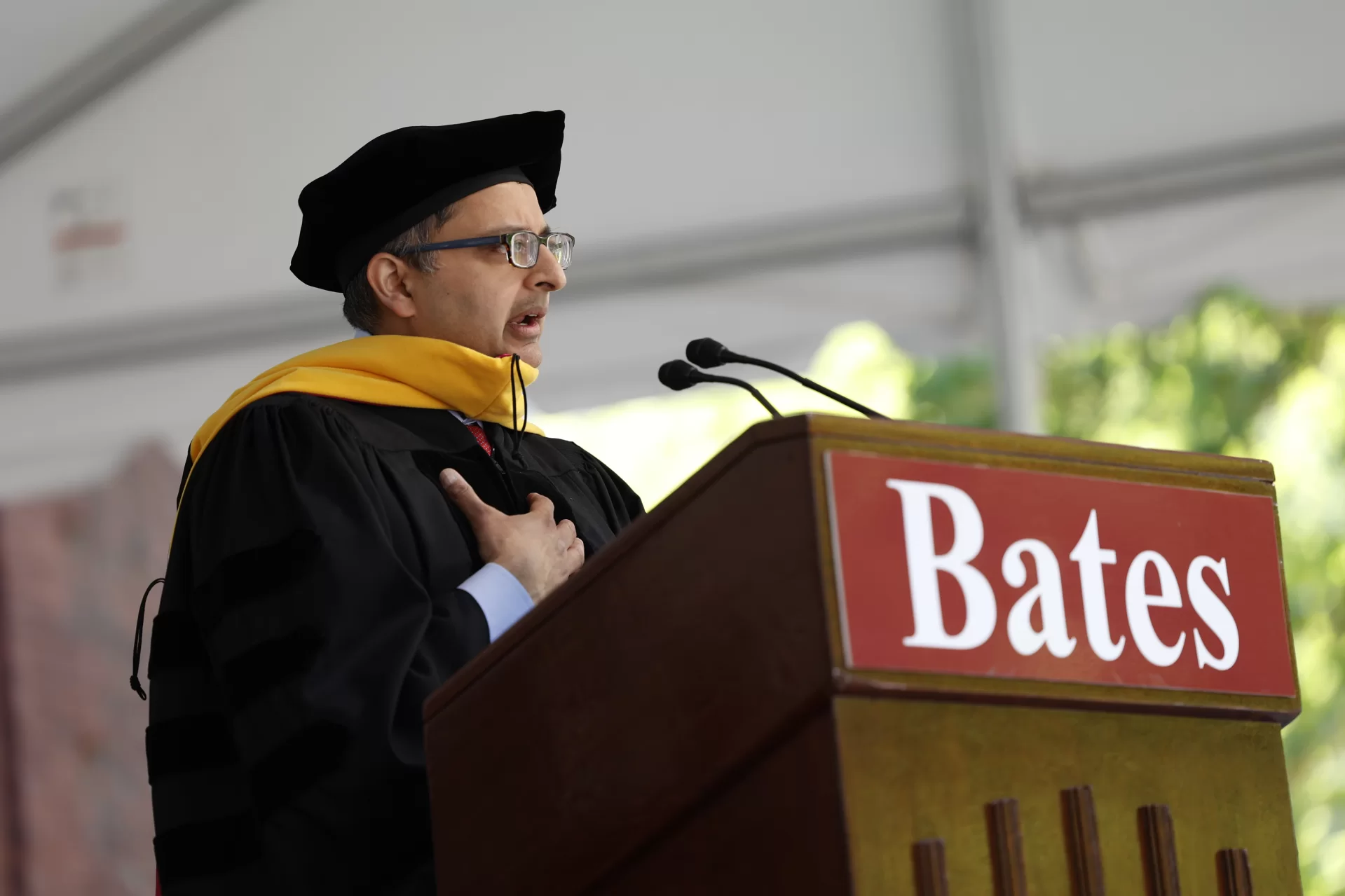
Shah’s father learned American and English-language humor by watching American television, especially M*A*S*H, the classic 1970s comedy-drama series about an Army field hospital during the Korean War.
At its best, M*A*S*H showed how humor and sadness can coexist. Shah said his father could “bring humor into situations where I would have least expected to find it.” And that’s being human.
“The human mind is a magnificent thing,” said Shah. “It can be happy and sad at the same time. You can hold grief and joy in your hands at the exact same moment.”
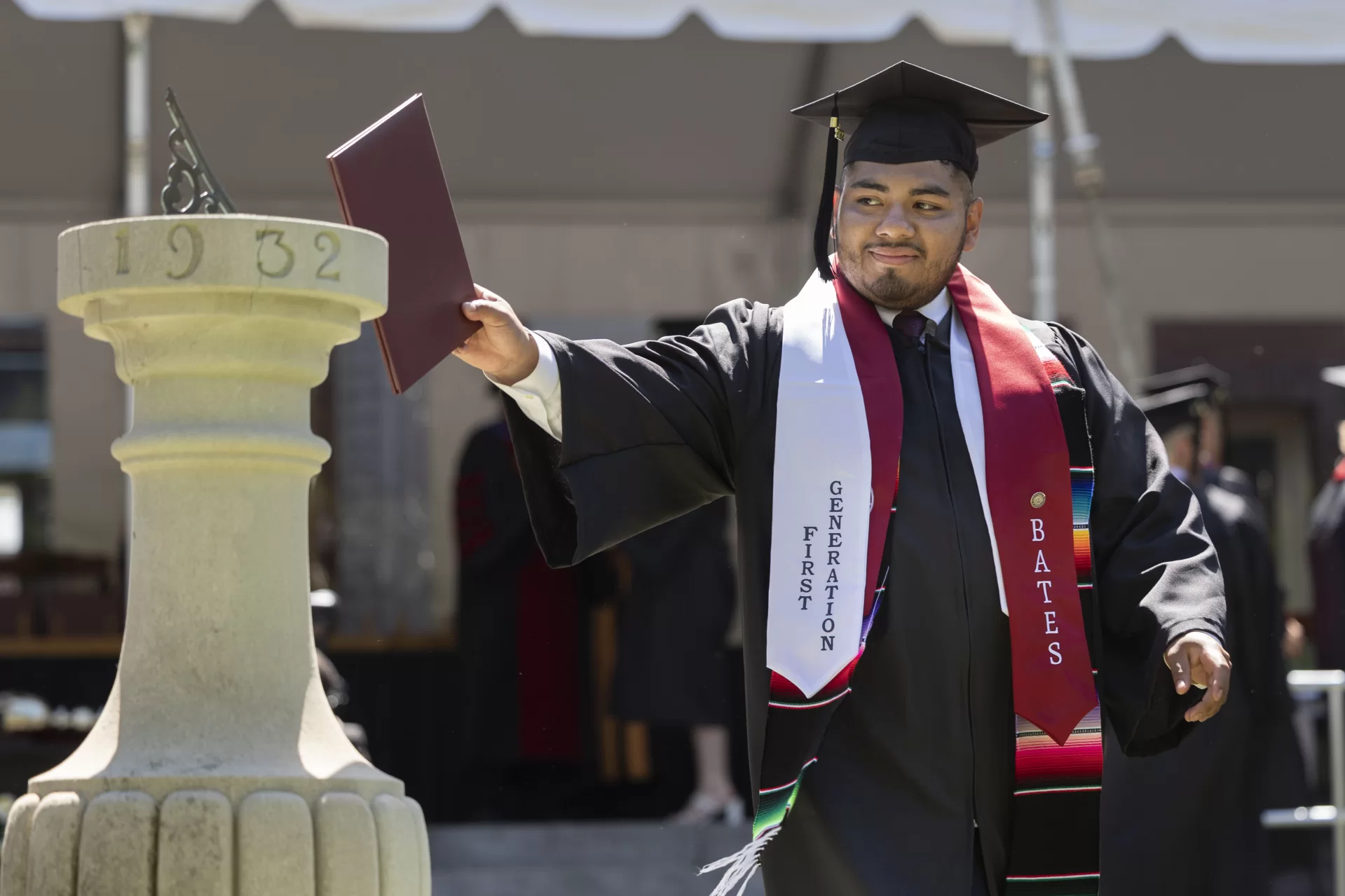
Even during a pandemic, “you’re allowed to laugh,” he said, even if, these days, “humor is fraught. The world is dark and there are those who suggest that a well-timed joke may not be appropriate. Don’t believe them. We need the levity that humor brings. Laughter during dark days doesn’t diminish the weight of the shadows; it just makes them a little bit easier to bear.”
As they head out into the world, the new Bates grads will often see themselves as one of the smartest people in the room, Shah said. “The first thing you should do is find a bigger room.”
The second is to use the tools of a Bates education. “Bates has prepared you to be anyone, any time, in any place,” he concluded. “But my ask is that you chose to be someone. Choose to carry the qualities of humility, humanity, and humor with you wherever you go next.“
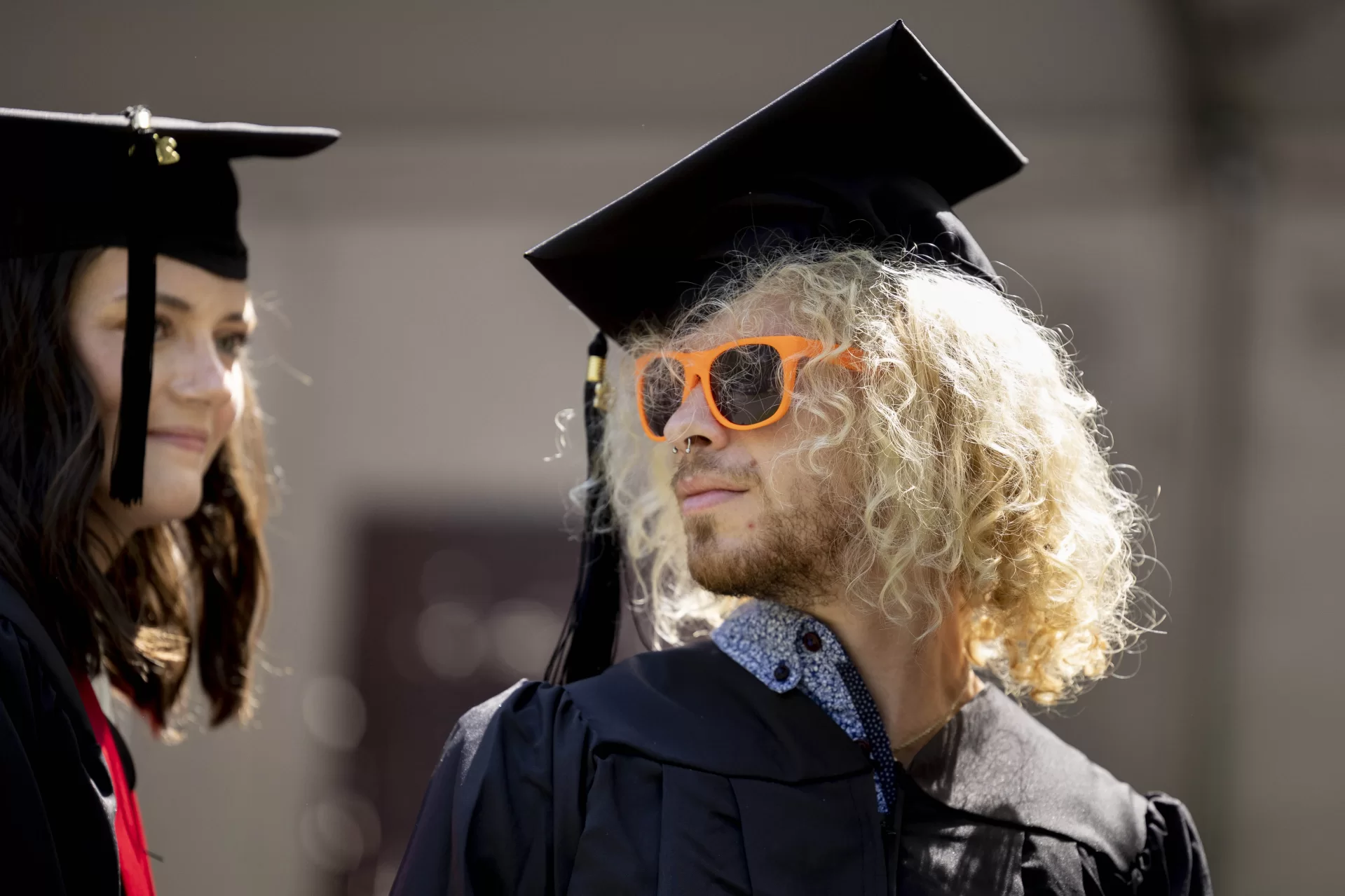
In her Senior Address, Chico used a seasonal metaphor to describe her growth at Bates as a first-generation college student. A self-described “plant person,” Chico thought she was like her sturdy pothos plant when she arrived at Bates, so resilient it barely needed nurturing.
“Like so many first generation students and people of color…I thought that I owed it to my family and everyone who helped me get here to be perfect.”
That meant being a science major — never mind that she didn’t really like science — and then advancing to medical school. “I had this crazy standard for myself that was really stressful and overwhelming, but like the pothos plant, I thought I would just take care of myself for these next four years. I was lucky to be here and I would make the most of it. No water or sunlight required.”
As she pivoted from science to the humanities, as a double major in Africana and in rhetoric, film, and screen studies, Chico discovered that it’s OK to need and ask for help, like her “dramatic” Chinese money plant.
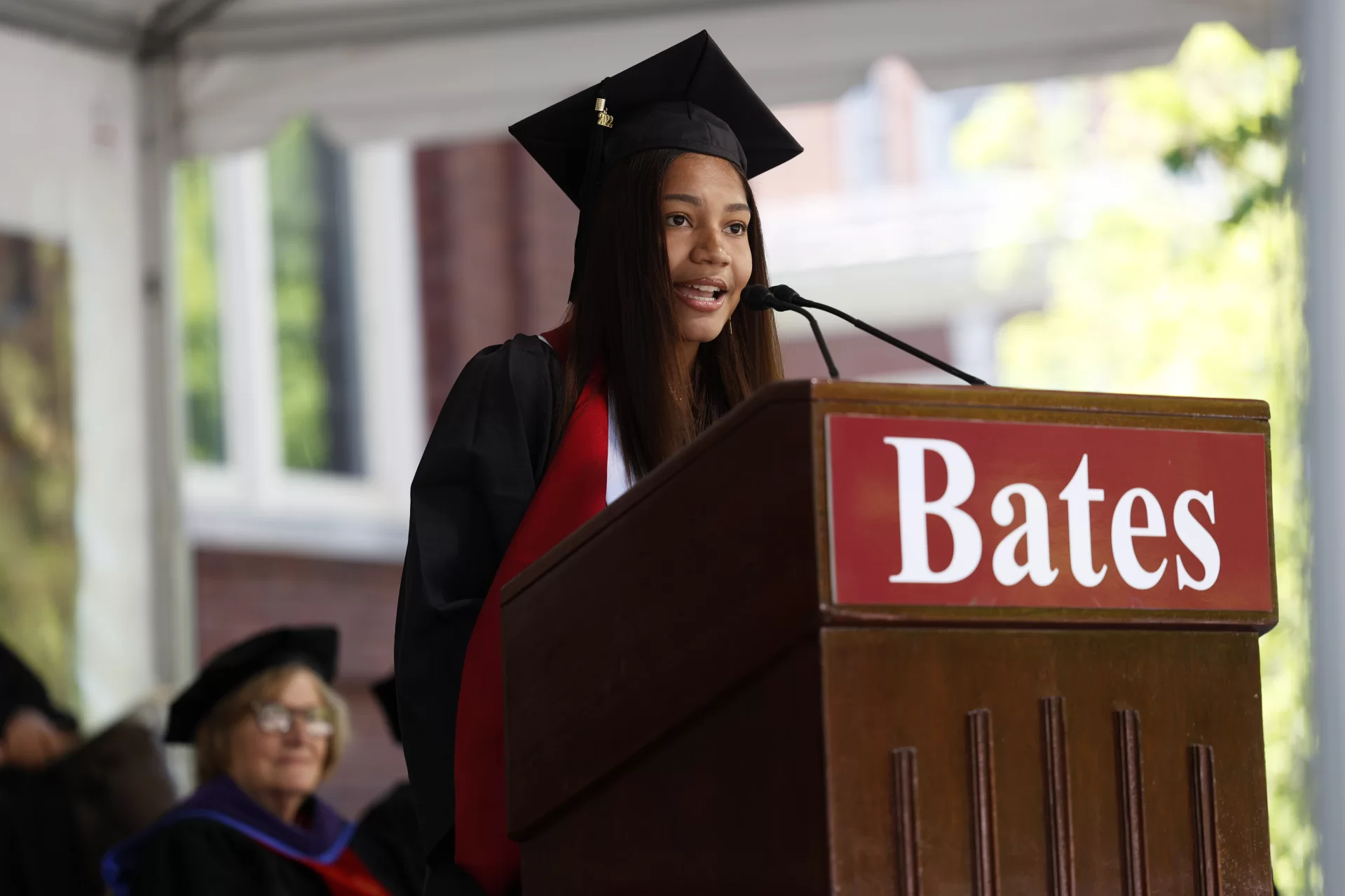
“I had to learn to believe in myself, but I also had to learn that it was okay to ask for help. Like the Chinese money plant, I had days where I was drooping, feeling defeated. But it was on those hard days that my professors watered me with their knowledge and support.”
The awarding of the day’s honorary degrees featured a moment of sweet disorder as President Spencer conferred the honorary degree for Michael Bonney ’80 not once but twice.
The first time, Spencer, who worked closely with Bonney in his nine years of service as chair of the Board of Trustees, choked up as she delivered the conferral. So a few minutes later, just before Shah was presented his honorary degree, Spencer paused the proceedings, apologized, and asked Bonney to return to her side so she could present him his degree, “again and correctly.” She said:
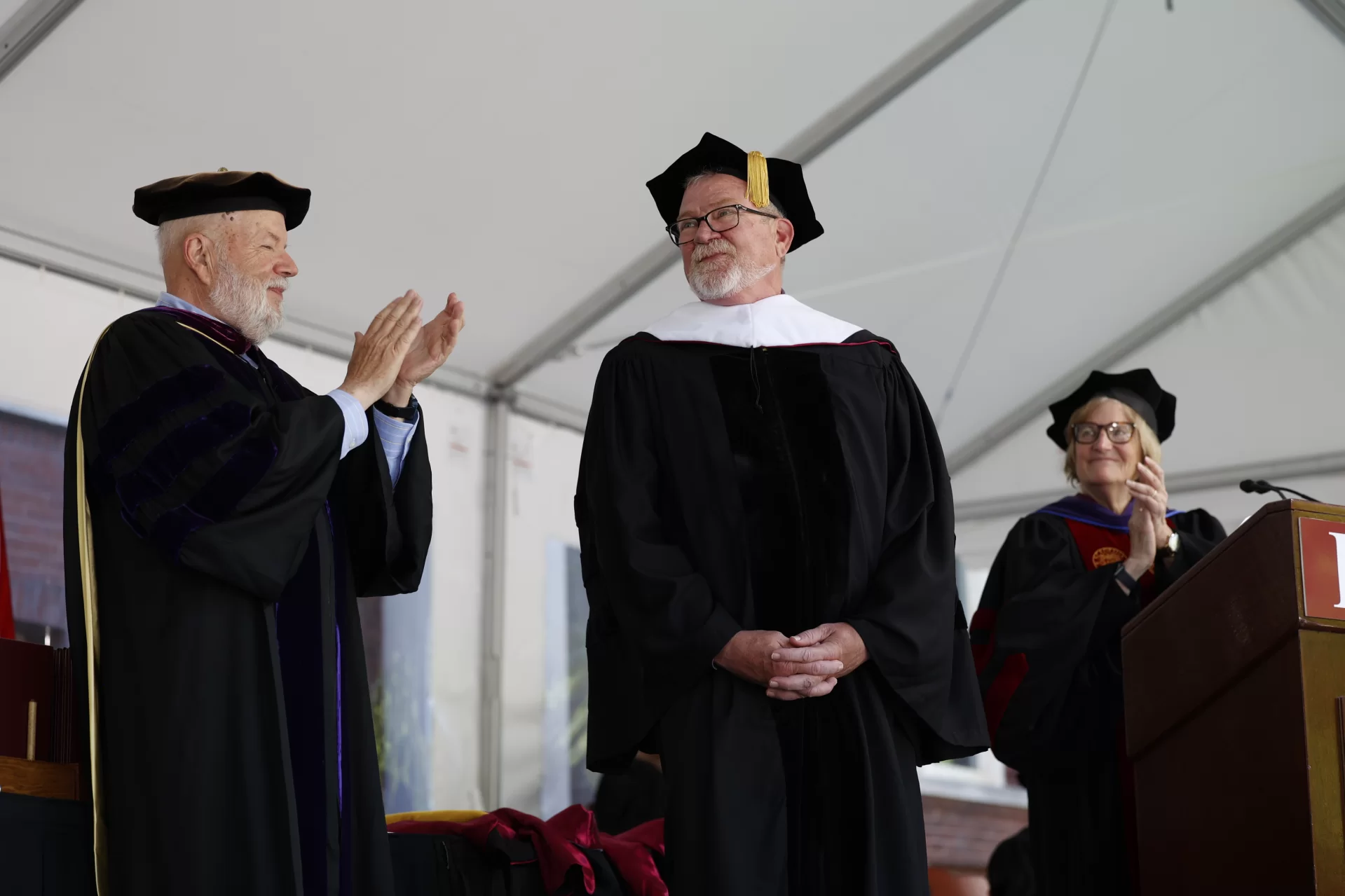
“Whenever and however we tell your story, we tell it with gratitude and pride. We know what this college means to you, and we only hope that you know how very much you mean to us.”
As Commencement approached its close, Jennifer Crawford ‘01 welcomed the newly minted graduates to their alumni lives. “No matter where life takes you, you will forever be part of an accomplished and dynamic community of over 24,000 Bobcats strong who…will forever be part of your extended family.”
In her benediction, the Rev. Brittany Longsdorf compared the seniors to the resilient Eastern white pine, the official Maine tree. She asked the seniors to remember how much they have always been valued as they leave Bates and begin their next chapter.
In this moment of awe and wonder, may you breathe deep as you prepare to begin again; feel our collective blessing on the journey ahead just as you have been and continue to be a blessing to Bates. It is time to cross this threshold.
